On the afternoon of June 9th, Dr. Ma Muqing, a teacher and master's supervisor of the School of Foreign Languages of Shanghai Polytechnic University, was invited to carry out a special academic lecture for the teachers of the Department of English (Sino-US Cooperation)— “ChatGPT and the Future of Foreign Language Education: Innovative Application of Artificial Intelligence in Foreign Language Teaching and Scientific Research”, which was chaired by Mr. Huang Fang, Director of English Department (Sino-US Cooperation).

At the beginning of the lecture, Dr. Ma firstly gave a brief introduction on the current research and application status of ChatGPT, and pointed out that AI technology plays a positive role in promoting scientific research and teaching. In the lecture, he introduced five aspects in detail, including the basic concepts of ChatGPT and related artificial intelligence, common language model applications, the applications of artificial intelligence in language teaching and scientific research, as well as the skills and risks of using AI.
Firstly, Dr. Ma introduced the working principle, training process and application fields of AI technology represented by ChatGPT, and compared three common intelligent tools of ChatGPT, Bing and Bard to the teachers through live demonstration. In response to everyone’s attention to the application of artificial intelligence, Dr. Ma introduced in detail the methods of using ChatGPT to learn language knowledge, as well as AI-based PPT production, language testing, online course design and production, video production, and other applications that are closely related to work and learning. He demonstrated the powerful capabilities of AI tools in text processing such as generating, summarizing, and correcting, as well as producing images and videos from text through prompts (prompt words) designed in advance.
Next, Dr. Ma shared how to use AI tools to carry out scientific research. For example, using Elicit to help brainstorming, SCISPACE to assist in reading academic papers, and using Research Rabbit、Litmaps and other AI tools to assist in organizing literature. In addition, he recommended tools that can help improve the reading and writing skills of teachers and students and some other practical AI tools, highlighting the risks that need to be guarded against when using AI tools. He pointed out that although AI has made significant progress in many aspects, it is still not perfect. We should pay attention to protect the privacy of our personal data in the process of using it and do not rely too much on AI tools. Dr. Ma’s lecture was warmly welcomed by the faculty members of the department, which not only opened up everyone’s research horizons, but also triggered in-depth thinking about AI intelligent technologies and applications. During the question-and-answer session of the lecture, teachers were active and raised doubts, and Dr. Ma patiently answered them one by one.

Towards the end of the lecture, Director Huang Fang summarized the lecture, emphasizing that researchers can combine their own research directions and AI technology to develop research ideas and conduct research more efficiently. This lecture provided a good platform for academic exchanges and created a strong academic atmosphere for our teachers, who had a deeper understanding of AI technology and benefited a lot.


